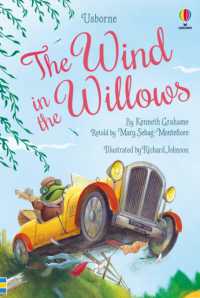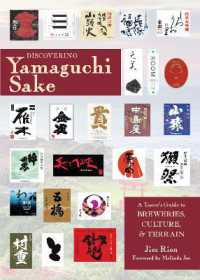- ホーム
- > 洋書
- > 英文書
- > Literary Criticism
Full Description
Drawing on a global history of politicized writing, this book explores literature's utility as a mode of activism and aesthetic engagement with the political challenges of the current moment.
The question of literature's 'uses' has recently become a key topic of academic and public debate. Paradoxically, however, these conversations often tend to bypass the rich history of engagements with literature's distinctly political uses that form such a powerful current of 20th- and 21st-century artistic production and critical-theoretical reflection.
The Political Uses of Literature reopens discussion of literature's political and activist genealogies along several interrelated lines: As a foundational moment, it draws attention to the important body of interwar politicized literature and to debates about literature's ability to intervene in social reality. It then traces the mobilization of related conversations and artistic practices across several historical conjunctures, most notably the committed literature of the 1960s and our own present.
In mapping out these geographically and artistically diverse traditions - including case studies from the Americas, Europe, Africa, India and Russia - contributors advance critical discussions in the field, making questions pertaining to politicized art newly compelling to a broader and more diverse readership. Most importantly, this volume insists on the need to think about literature's political uses today - at a time when it has become increasingly difficult to imagine any kind of political efficacy for art, even as the need to do so is growing more and more acute. Literature may not proffer easy answers to our political problems, but as this collection suggests, the writing of the 20th century holds out aesthetic resources for a renewed engagement with the dilemmas that face us now.
Contents
List of Illustrations
Introduction
Ivana Perica (University of Vienna, Austria) and Benjamin Kohlmann (University of Regensburg, Germany)
Part I: Revolution, Internationalism and Literary Politics: Interwar Paradigms
1. Marxists Out of Work: Literature and the Useless in Interwar India
Benjamin Conisbee Baer (Princeton University, USA)
2. Politics and Literature on the Peruvian Periphery: Realism and Experimentation in the Works of César Vallejo and José Carlos Mariátegui
Juan E. De Castro (The New School, USA)
3. Reusing Artaud? On the Contemporaneity of Messages révolutionnaires (1936)
Sandra Fluhrer (Freie Universität Berlin, Germany, and University of California-Berkeley, USA)
4. On the German Popular Front and the Novel in Historical and International Context
Hunter Bivens (University of California-Santa Cruz, USA)
5. Narrative Struggle: "Good" and "Bad" Uses of Literature in the Committed Novel of the 1930s (Aragon, Dos Passos)
Aurore Peyroles (University of Regensburg, Germany)
6. Moscow, 1934 - Yan'an, 1942: The Manifesto as Lived Experience
Steven Lee (University of California-Berkeley, USA)
Part II: Politicizing Theory and Literary Practice in the Global 1960s: Inflection Points
7. Militant Structures of Feeling: Raymond Williams, Claude Lefort, and Workers' Inquiry
Daniel Hartley (Durham University, UK)
8. Solidarity in Black and White
J. Daniel Elam (University of Hong Kong)
9. Notes from the Underground, or: Why and How Was Non-Marxist Theory Resisted by Non-Marxists in a Totalitarian Society
Galin Tihanov (Queen Mary University of London, UK)
10. Workshops of Abolition: Attica Print Culture and Small Press Poetry
Mark Nowak (Manhattanville College, USA)
11. An Autofictional Intervention into Working-Class Literature: Karin Struck's Klassenliebe and the Werkkreis Literatur der Arbeitswelt
Christoph Schaub (University of Vechta, Germany)
12. Feminism and Progressive Writing in Twentieth-Century India
Ulka Anjaria (Brandeis University, USA)
Section III: The Political Uses of Literature Today: Legacies and Departures
13. Cultural Politics after the Arab Spring: A New Lotus for a New World?
Maryam Fatima (University of Massachusetts-Amherst, USA)
14. Segments of a Larger Narrative: Political Formalism and Working-Class Story Cycles
Dirk Wiemann (University of Potsdam)
15. Sedimented Reading Habits? The Future Utopia in Contemporary African Science and Speculative Fiction
Peter Maurits (University of Erlangen-Nuremberg, Germany)
16. Literary Activism in Contemporary Africa: Praxis, Publics and the Shifting Landscapes of the 'Literary'
Madhu Krishnan (University of Bristol, UK)
Notes of Contributors
Index








